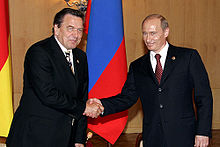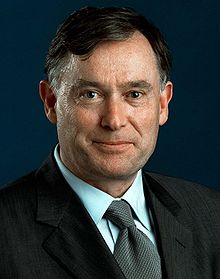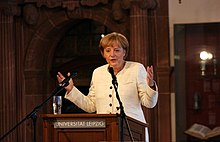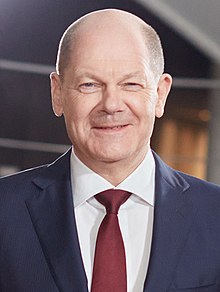History of Germany (1990–present)
This article needs additional citations for verification. (April 2023) |
Federal Republic of Germany Bundesrepublik Deutschland (German) | |||||||||
|---|---|---|---|---|---|---|---|---|---|
| Anthem: Deutschlandlied[a] "Song of Germany" | |||||||||
Location of History of Germany (1990–present) (dark green) – in Europe (light green & dark grey) | |||||||||
| Capital | Berlin[b] 52°31′N 13°23′E / 52.517°N 13.383°E Bonn (seat of government, 1990–1999) 50°44′N 7°6′E / 50.733°N 7.100°E | ||||||||
| Largest city | Berlin 52°31′N 13°23′E / 52.517°N 13.383°E | ||||||||
| Official language | German[c] | ||||||||
| Demonym(s) | German | ||||||||
| Government | Federal parliamentary republic | ||||||||
| Frank-Walter Steinmeier | |||||||||
| Olaf Scholz | |||||||||
| Legislature | |||||||||
| Bundesrat | |||||||||
| Bundestag | |||||||||
| Formation | |||||||||
| 3 October 1990 | |||||||||
| 15 March 1991 | |||||||||
| 31 August 1994 | |||||||||
| Area | |||||||||
• Total | 357,022 km2 (137,847 sq mi)[5] (63rd) | ||||||||
• Water (%) | 1.27 (2015)[4] | ||||||||
| Population | |||||||||
• 2020 estimate | |||||||||
• Density | 232/km2 (600.9/sq mi) (58th) | ||||||||
| GDP (PPP) | 2021 estimate | ||||||||
• Total | |||||||||
• Per capita | |||||||||
| GDP (nominal) | 2021 estimate | ||||||||
• Total | |||||||||
• Per capita | |||||||||
| Gini (2019) | low inequality | ||||||||
| HDI (2019) | very high (6th) | ||||||||
| Currency | 1990–1999: Deutsche Mark (DM) 1999–present: Euro (€) (EUR) | ||||||||
| Time zone | UTC+1 (CET) | ||||||||
• Summer (DST) | UTC+2 (CEST) | ||||||||
| Drives on | Right | ||||||||
| Calling code | +49 | ||||||||
| ISO 3166 code | DE | ||||||||
| Internet TLD | .de | ||||||||
| |||||||||
| History of Germany |
|---|
 |
The history of Germany from 1990 to the present spans the period following German reunification, when West Germany and East Germany were reunited after being divided during the Cold War. Germany after 1990 is referred to by historians as the Berlin Republic (Berliner Republik). This time period is also determined by the ongoing process of the "inner reunification" of the formerly divided country.
Economics
[edit]Stagnation in 1990s
[edit]After the fall of the Berlin Wall, a wave of optimism for a more positive future swept across Germany, but that future proved difficult to realize.[10] Western Germany invested over two trillion marks in the rehabilitation of the former East Germany, helping it to transition to a market economy and cleaning up the environmental degradation. By 2011 the results were mixed, with slow economic development in the East, in sharp contrast to the rapid economic growth in both west and southern Germany. Unemployment was much higher in the East, often over 15%. Economists Snower and Merkl (2006) suggest that the malaise was prolonged by all the social and economic help from the German government, pointing especially to bargaining by proxy, high unemployment benefits and welfare entitlements, and generous job-security provisions.[11]
The German economic miracle petered out in the 1990s, so that by the end of the century and the early 2000s it was ridiculed as "the sick man of Europe."[12] It suffered a short recession in 2003. The economic growth rate was a very low 1.2% annually from 1988 to 2005. Unemployment, especially in the eastern districts, remained stubbornly high despite heavy stimulus spending. It rose from 9.2% in 1998 to 11.1% in 2009. The worldwide Great Recession of 2008-2010 worsened conditions briefly, as there was a sharp decline in GDP. However unemployment did not rise, and recovery was faster than almost anywhere else. The old industrial centers of the Rhineland and North Germany lagged as well, as the coal and steel industries faded in importance.
Resurgence after 2010
[edit]The economic policies were heavily oriented toward the world market, and the export sector continued to be very strong.[13] Prosperity was pulled along by exports that reached a record of $1.7 trillion US dollars in 2011, or half of the German GDP, or nearly 8% of all of the exports in the world. While the rest of the European Community struggled with financial issues, Germany took a conservative position based on an extraordinarily strong economy after 2010. The labor market proved flexible, and the export industries were attuned to world demand.[14][15]
As of December 2023, Germany is the fourth largest economy in the world after the United States, China and Japan and the largest economy in Europe. It is the third largest export nation in the world.[16]
Chancellorship of Helmut Kohl in a reunited Germany (1990–1998)
[edit]Five new states
[edit]
On October 3, 1990, the German Democratic Republic was dissolved, five states were recreated (Brandenburg, Mecklenburg-Vorpommern, Saxony, Saxony-Anhalt and Thuringia) and the new states became part of the Federal Republic of Germany, an event known as the German Reunification.
Elections for new state parliaments were held in the five states on October 14, and the Christian Democratic Union of Germany became the largest party in all states except Brandenburg, where the Social Democratic Party of Germany became the largest party.
The reunified Berlin became the capital of Germany on October 3, although the government continued to have its seat in Bonn until 1999. December 2 marks the first elections for the city parliament after reunification.
Kohl's fourth term, 1991–1994
[edit]The first federal election after reunification, the 1990 federal election, took place on December 2 in that year. The CDU became the largest party with 43.8%, followed by the SPD (33.5%) and the Free Democratic Party of Germany (11%).[17][18]
On June 20, 1991, the Bundestag decided that the parliament and parts of the government and central administration would be relocated from Bonn to the capital, Berlin. At this time, the term "Berlin Republic" (alluding to the Cold War era "Bonn Republic" and the interwar period "Weimar Republic") emerged.
Roman Herzog, a former Judge at the Federal Constitutional Court of Germany, was elected President of Germany in 1994, succeeding Richard von Weizsäcker.
Kohl's fifth term, 1994–1998
[edit]Following the 1994 federal election, Helmut Kohl was reelected as Chancellor for his fifth and last term.
Chancellorship of Gerhard Schröder (1998–2005)
[edit]
First term, 1998–2002
[edit]The ruling liberal-conservative coalition government, consisting of the CDU/CSU and the FDP, lost the 1998 federal election, and Gerhard Schröder was elected as Chancellor, at the head of a coalition government consisting of his own SPD party and The Greens. Joschka Fischer, a leading Green politician, became Vice Chancellor and Foreign Minister.
Shortly after the formation of the government, Minister of Finance Oskar Lafontaine, a former SPD chairman and rival of Schröder, resigned from the cabinet. He was succeeded as Minister of Finance by Hans Eichel.
In 1998, it became known that the CDU/CSU had received anonymous funding. Helmut Kohl subsequently resigned as honorary party chairman, and in 2000, Wolfgang Schäuble resigned as party chairman. Angela Merkel, the Secretary General of the CDU since 1998, emerged as a leading figure in the party and was elected chairwoman in 2000.
In 1999, Johannes Rau was elected President of Germany. Rau had tried to be elected president for several years.
A large tax reform was implemented in 2000. After 2003, the federal government enacted a number of reforms in social and health policy, known as Agenda 2010. The Schröder government also stressed environmental issues and promoted the reduction of greenhouse gas.
Germany took part in the NATO war against Yugoslavia in 1999, when German forces saw combat for the first time since World War II. Chancellor Schröder supported the war on terror following the September 11 attacks against the United States, and Germany sent forces to Afghanistan. Germany also sent forces to Kosovo and other parts of the world.
In 1999, Germany partially adopted the Euro, which completely replaced the Deutsche Mark as the currency of Germany in 2002.
Several German cities, notably Dresden and Magdeburg, experienced severe flooding during the 2002 European floods.
Second term, 2002–2005
[edit]In 2002, Edmund Stoiber was the candidate for Chancellor for the CDU/CSU, the first time a CSU politician was chancellor candidate since the candidacy of Franz Josef Strauss in 1980. Both CDU/CSU and the SPD polled 38.5% in the 2002 federal election. Since the Greens became larger than the liberals, Gerhard Schröder's government was reelected.
Germany and France vehemently opposed the 2003 Iraq War, leading the administration of George W. Bush to label Germany and France as the Old Europe, as opposed to the countries (mainly former east bloc countries) that supported the war. However, Germany supported the United States militarily in other parts of the world, notably in the Horn of Africa and Kuwait.

The early 2000s saw increased unemployment and an aging population. The government instituted further reforms to meet these challenges, known as the Hartz reforms. However, as the Bundesrat of Germany had a CDU/CSU majority, the government of Gerhard Schröder was dependent on support from the conservatives in order to pass legislation.
On May 23, 2004, Horst Köhler, the former head of the International Monetary Fund and a CDU politician, was elected President of Germany. Köhler, who was previously relatively unknown in Germany, quickly became one of the country's most popular politicians.
After a bitter defeat for the SPD in state elections in the state of North Rhine-Westphalia (22 May 2005), Chancellor Schröder asked the German Bundestag (lower house of parliament) for a vote of no-confidence. Schröder argued that it had become increasingly difficult to push for the necessary socio-economic reforms because of the opposition majority in the upper house of the parliament, the Bundesrat, as well as the tensions within his own party. After losing this vote, as intended, on July 1, Chancellor Schröder was able to ask President Horst Köhler to call new federal elections. On 21 July 2005 the President agreed to Chancellor's request and dissolved the parliament, scheduling early parliamentary elections for 18 September.
Chancellorship of Angela Merkel (2005–2021)
[edit]First term, 2005–2009
[edit]
The 2005 federal election resulted in a stalemate for both major parties, SPD and CDU/CSU, as they won almost the same number of seats, but not enough to form a majority without the support of several smaller parties. This was resolved on November 11, 2005, when both parties agreed to form a grand coalition led by Angela Merkel who became the first female Chancellor of Germany.[19]
Under Merkel, Germany hosted the 2007 G8 summit in Heiligendamm, Mecklenburg.
In January 2009 the German government approved a €50 billion economic stimulus plan to protect several sectors from a downturn and a subsequent rise in unemployment rates.[20]
Second term, 2009–2013
[edit]In the 2009 federal election, the CDU/CSU and the FDP won a majority and Angela Merkel could form a coalition with the liberals, the Cabinet Merkel II. Guido Westerwelle became the new Vice Chancellor. The Social Democrats did especially poorly in the election.[21]
Among the major German political projects initiated in this term are the energy transition (Energiewende) [In fact, it was the previous government which initiated the exit from nuclear power. This policy was reversed by Merkel before she was forced into a U-turn by Fukushima.] for a sustainable energy supply, the "Debt Brake" (Schuldenbremse) for balanced budgets, the reform of German immigration laws, and high-tech strategies for the informatization and future transition of the German economy, summarized as Industry 4.0.[22]
Third term, 2013–2018
[edit]In December 2013, the grand coalition was re-established in a Third Merkel cabinet. The FDP Liberals are not present in the Bundestag for the first time. Since 2014, the newly established right-wing populist Alternative for Germany (AfD) party were elected for various Landtag mandates.
Major political projects of the second grand coalition under Merkel are the legislation for a general minimum wage in Germany and various welfare reforms, including pension reforms. Projects initiated with the Liberals in the second term are largely continued.
Germany was affected by the European migrant crisis in 2015 as it became the final destination of choice for many asylum seekers from Africa and the Middle East entering the EU. The country took in over a million refugees and migrants and developed a quota system which redistributed migrants around its federal states based on their tax income and existing population density.[23] The decision by Merkel to authorize unrestricted entry led to heavy criticism in Germany as well as within Europe.[24][25]
Fourth term, 2018–2021
[edit]In 2017, Angela Merkel was elected to a fourth term as Chancellor. The FDP reentered the Bundestag, and for the first time the right-wing populist AfD also entered in the election.[26] In March 2018, Angela Merkel formed another grand coalition with Social Democrats (SPD) after five months of political deadlock since September's election.[27] Angela Merkel has said on her fourth term that she would not seek another term in the next elections and that she would retire.
Chancellorship of Olaf Scholz (2021–present)
[edit]
On 8 December 2021, Social Democrat Olaf Scholz was sworn in as chancellor. He formed a traffic-light coalition government with the Greens and the FDP after the SPD won a plurality as a result of the 2021 federal election.[28][29]
Frank-Walter Steinmeier was re-elected for a second five-year term as Germany's president, a first for an SPD president, attributed to his perception as a symbol of consensus and continuity.[30]
Russia's invasion of Ukraine in 2022 and its economic effects dominated Scholz's early foreign and domestic policies. Germany’s previous foreign policy towards Russia (traditional Ostpolitik) was criticized for having been too credulous and soft towards Russia.[31] Scholz's Zeitenwende speech three days after the start of the invasion signaled a foreign policy shift in contemporary Germany, with billions of dollars in investments in the German military.[32][33] Scholz also approved direct military and economic aid to Ukraine. Amid a global energy crisis, Scholz committed to weaken dependence on Russian energy imports by halting certification of Nord Stream 2 while also committing to Merkel's policy of phasing out nuclear energy.[34][35] As of April 2023, over 1.06 million refugees from Ukraine were recorded in Germany.[36]
As of December 2023, Germany is the fourth largest economy in the world after the United States, China and Japan and the largest economy in Europe. It is the third largest export nation in the world.[16]
Rise of the Far Right and the AfD
[edit]On 5 June 2023, The Alternative for Germany in Thuringia won its first district election in Sonneberg, despite all the other parties supporting the CDU Candidate.[37][38][39][40]
On 17 December 2023, The AfD candidate for mayor of Pirna Saxony won in an election. it is the first mayor of a city with more than 20,000 inhabitants to be held by Alternative for Germany.[41][42]
In the 2024 Thuringian state election, the Alternative for Germany AfD became the first far-right party in Germany since the Nazi Party to win a plurality of seats in a state election.[43][44][45][46][47]
Notes
[edit]- ^ From 1952 to 1990, the entire "Deutschlandlied" was the national anthem, but only the third verse was sung on official occasions. Since 1991, the third verse alone has been the national anthem.[1]
- ^ Berlin is the sole constitutional capital and de jure seat of government, but the former provisional capital of the Federal Republic of Germany, Bonn, has the special title of "federal city" (Bundesstadt) and is the primary seat of six ministries.[2]
- ^ Danish, Low German, Sorbian, Romany, and Frisian are recognised by the European Charter for Regional or Minority Languages.[3]
References
[edit]- ^ Bundespräsidialamt. "Repräsentation und Integration" (in German). Archived from the original on 7 March 2016. Retrieved 8 March 2016.
- ^ "The German Federal Government". deutschland.de. 23 January 2018. Archived from the original on 30 April 2020.
- ^ Gesley, Jenny (26 September 2018). "The Protection of Minority and Regional Languages in Germany". Library of Congress. Archived from the original on 25 May 2020.
- ^ "Surface water and surface water change". Organisation for Economic Co-operation and Development (OECD). Archived from the original on 24 March 2021. Retrieved 11 October 2020.
- ^ "Germany". World Factbook. CIA. Archived from the original on 9 January 2021. Retrieved 29 March 2020.
- ^ "Bevölkerung nach Geschlecht und Staatsangehörigkeit". Destatis. Archived from the original on 23 August 2019. Retrieved 15 July 2018.
- ^ a b c d "World Economic Outlook database: April 2021". International Monetary Fund. April 2021. Archived from the original on 12 April 2021. Retrieved 12 April 2021.
- ^ "Gini coefficient of equivalised disposable income". Eurostat. Archived from the original on 9 October 2020. Retrieved 15 December 2020.
- ^ "Human Development Report 2020". United Nations Development Programme. 15 December 2020. Archived from the original on 15 December 2020. Retrieved 15 December 2020.
- ^ Schulze-Wessel, Martin (2016). "'Wind of Change' and the New Populism in East-Central Europe". Proceedings of the Indian History Congress. 77: 835–39 – via JSTOR.
- ^ Dennis J. Snower, and Christian Merkl, "The Caring Hand that Cripples: The East German Labor Market after Reunification," American Economic Review, May 2006, Vol. 96 Issue 2, pp 375-382
- ^ Herbert Kitschelt, and Wolfgang Streeck, "From stability to stagnation: Germany at the beginning of the twenty-first century." West European Politics 26.4 (2003): 1-34 online.
- ^ Christopher S. Allen, "Ideas, Institutions and Organized Capitalism: The German Model of Political Economy Twenty Years after Unification," German Politics and Society, (2010) 28#2 pp 130-150
- ^ Christian Dustmann, et al. "From sick man of Europe to economic superstar: Germany's resurgent economy." Journal of Economic Perspectives 28.1 (2014): 167-88. online
- ^ Florian Spohr, "Germany’s Labour Market Policies: How the Sick Man of Europe Performed a Second Economic Miracle." in Great Policy Successes (Oxford UP, 2019) pp. 283-303 online.
- ^ a b "Economic Key Facts Germany". 5 December 2023.
- ^ Karl Hugo Pruys, Kohl: Genius of the Present: A Biography of Helmut Kohl (1996)
- ^ Diethelm Prowe, "Kohl and the German Reunification Era," Journal of Modern History, March 2002, Vol. 74 Issue 1, pp 120-38 in JSTOR
- ^ Silvia Bolgherini and Florian Grotz, eds. Germany After the Grand Coalition: Governance and Politics in a Turbulent Environment (Palgrave Macmillan; 2011)
- ^ "Germany agrees on 50-billion-euro stimulus plan". France 24. 6 January 2009. Archived from the original on 13 May 2011. Retrieved 27 March 2011.
- ^ Thorsten Fass, "The German Federal Election of 2009: Sprouting Coalitions, Drooping Social Democrats," West European Politics, July 2010, Vol. 33 Issue 4, pp 894-903
- ^ "Government declaration by Angela Merkel". ARD Tagesschau (German). 29 January 2014. Archived from the original on 1 January 2015. Retrieved 15 December 2014.
- ^ "Migrant crisis: Migration to Europe explained in seven charts". BBC News. 28 January 2016. Retrieved 31 January 2016.
- ^ "Chancellor Running Out of Time on Refugee Issue". Der Spiegel. 19 January 2016. Retrieved 7 June 2017.
- ^ "Merkel Critic Says Chancellor's Refugee Policy Is a 'Time Bomb'". Bloomberg. 9 August 2016. Retrieved 7 June 2017.
- ^ Clarke, Seán. "German elections 2017: full results". the Guardian.
- ^ "Germany coalition deal: Merkel set to lead fourth government". BBC News. 4 March 2018.
- ^ Crowcroft, Orlando (8 December 2021). "'New era': Scholz becomes Germany's new chancellor as Merkel bows out". euronews.
- ^ "Germany elections: Centre-left claim narrow win over Merkel's party". BBC News. 27 September 2021.
- ^ Welle (www.dw.com), Deutsche. "Frank-Walter Steinmeier elected to second term as German president | DW | 13.02.2022".
- ^ "The ruins of Ostpolitik". www.eurozine.com. 23 February 2022.
- ^ "'A new era': Germany rewrites its defence, foreign policies". France 24. AFP. 27 February 2022. Retrieved 1 March 2022.
- ^ "Ukraine crisis: Germany halts Nord Stream 2 approval". dw.com. 22 February 2022. Retrieved 22 February 2022.
- ^ "Scholz and liberal finance minister clash over nuclear phase-out". Euractiv. 9 June 2022.
- ^ "How Bad Will the German Recession Be?". Der Spiegel. 14 September 2022.
- ^ "Ukrainian refugees by country 2023". Statista.
- ^ "Germany: Far-right AfD wins first governing post – DW – 06/25/2023". Deutsche Welle.
- ^ "Germany's far-right AfD party wins historic victory in local election". 25 June 2023.
- ^ "Germany's far-right AfD wins vote to lead district for first time". Reuters. 26 June 2023.
- ^ "German far-right party wins its first county leadership post as it rises in polls". ABC News.
- ^ "Germany: Far-right AfD wins first city mayoral election – DW – 12/17/2023". Deutsche Welle.
- ^ "German far-right party makes electoral breakthrough".
- ^ "German far right wins first major election since World War II". The Washington Post. 1 September 2024. Archived from the original on 1 September 2024. Retrieved 2 September 2024.
- ^ "Far right set to win in a German state for the first time since WWII". The Washington Post. 1 September 2024. Archived from the original on 3 September 2024. Retrieved 2 September 2024.
- ^ "Far-right AfD wins eastern state in Germany's regional election". Al Jazeera. 1 September 2024. Archived from the original on 1 September 2024. Retrieved 2 September 2024.
- ^ "Success of far-right AfD shows east and west Germany are drifting further apart". The Guardian. 1 September 2024. Archived from the original on 1 September 2024. Retrieved 2 September 2024.
- ^ "German far right hails 'historic' election victory in east". BBC News. 1 September 2024. Archived from the original on 2 September 2024. Retrieved 2 September 2024.
Further reading
[edit]- Ash, Timothy Garton. In Europe's Name: Germany and the Divided Continent (1997), 700pp
- Bolgherini, Silvia. and Florian Grotz, eds. Germany After the Grand Coalition: Governance and Politics in a Turbulent Environment (Palgrave Macmillan; 2011) 231 pages; studies of the "Grand Coalition" of 2005-09 and the first Merkel government.
- Crawford, Alan, and Tony Czuczka. Angela Merkel: A Chancellorship Forged in Crisis (2013)
- Epstein, Catherine. "East Germany and Its History since 1989," Journal of Modern History Vol. 75, No. 3 (September 2003), pp. 634–661 in JSTOR
- Faas, Thorsten. "The German Federal Election of 2013: Merkel’s Triumph, the Disappearance of the Liberal Party, and Yet Another Grand Coalition." West European Politics 38#1 (2015): 238–247.
- Jarausch, Konrad H. The Rush to German Unity (1994), 304pp
- Kornelius, Stefan. Angela Merkel: The Chancellor and Her World (2013)
- Smith, Helmut Walser, ed. The Oxford Handbook of Modern German History (2011), excerpt pp 753–814
Primary sources
[edit]- Jarausch, Konrad H., and Volker Gransow, eds. Uniting Germany: Documents and Debates, 1944-1993 (1994)


 French
French Deutsch
Deutsch


